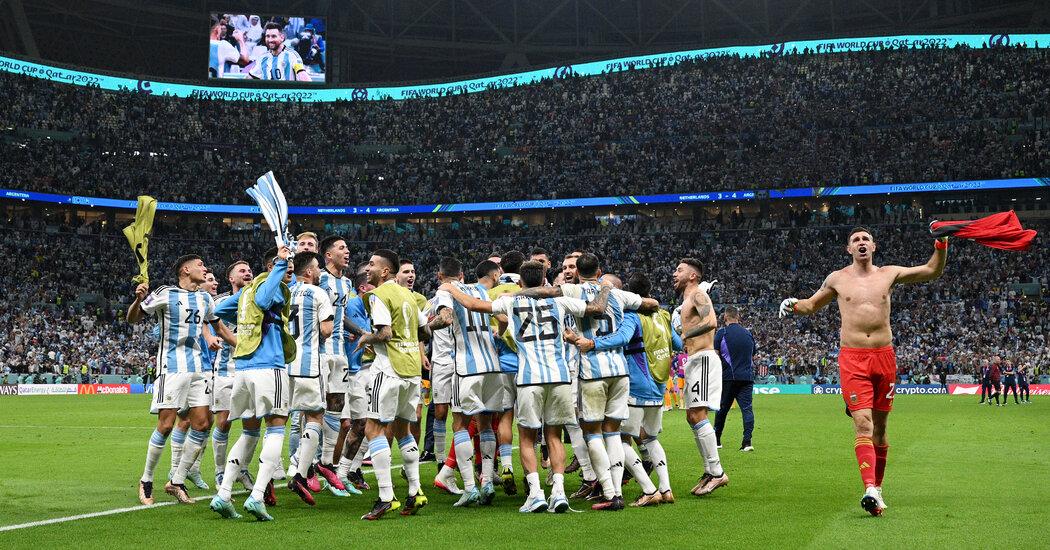
Get ready for the semifinals
Four countries will compete in the World Cup semifinals this week, after a weekend of surprises sent two favorites and two underdogs to the next round. Argentina will play Croatia tomorrow, and France will play Morocco on Wednesday.
Argentina is driven by the belief that winning this World Cup is Lionel Messi’s undeniable destiny. But Croatia has its own undeniable sense of purpose after beating Brazil, a top contender.
France knocked England out to advance. Morocco upset Portugal to become the first country in Africa and the Arab world to reach the semifinals. Its stout defense will be challenged by the tournament’s leading scorer, Kylian Mbappé, the most gifted player on the planet.
Qatar: The country is poised to become a critical energy source for Europe as the continent pivots from Russia.
Play our game: Where’s the ball?
Other updates:
Belgian authorities detained five people, including current and former members of the European Parliament, in an inquiry into possible bribes by Qatar.
China braces for a Covid surge
China is rolling back its Covid-19 restrictions. Now, Beijing is bracing for a surge in cases.
In near-freezing weather last week, residents of China’s capital lined up at hospitals and pharmacies. They sought help for fevers or waited to buy up dwindling stocks of at-home tests. The reported number of cases is unreliable and probably a significant undercount now that the government has moved away from mass testing.
The pivot has left many confused and anxious. The government is suddenly playing down the threat of the coronavirus, after three years of relentless propaganda. But to conserve resources, it is also urging residents not to seek help unless necessary.
Part of the challenge for the Communist Party: Less than 1 percent of China’s population have been infected through November, so many are vulnerable. After pushing shots last year, China has not yet moved on to administering fourth doses. And China’s vaccines are less effective than mRNA shots.
Lockerbie suspect arrested
A Libyan intelligence operative charged in the 1988 bombing of an American jetliner over Lockerbie, Scotland, was arrested by the F.B.I. He is being extradited to the U.S. to face prosecution for one of the deadliest terrorist attacks in U.S. history.
The arrest of the operative, Abu Agila Mohammad Mas’ud, was the culmination of a decades-long effort by the Justice Department to prosecute him. It is unclear how the U.S. government negotiated the extradition of Mas’ud.
He was being held at a Libyan prison for unrelated crimes when the Justice Department unsealed the charges against him two years ago. He is accused of building the explosive device used in the bombing of Pan Am Flight 103, which killed 270 passengers, including 190 Americans.
Background: Mas’ud confessed to the bombing in 2012 to a Libyan law enforcement official. His suspected role in the bombing received new scrutiny in a three-part documentary on “Frontline” on PBS in 2015.
What’s next: Extradition would allow Mas’ud to stand trial. But legal experts have expressed doubts about whether his confession, obtained in prison in war-torn Libya, would be admissible as evidence.
THE LATEST NEWS
Asia Pacific
Octagonal houses became a 19th-century fad after an amateur architect claimed they had better ventilation and more windows. They’re certainly quirky, but devotees gush about their panoramic views and all-day sunshine.
Lives lived: Hamish Kilgour, a founding member of the New Zealand band the Clean, died at 65.
ARTS AND IDEAS
Why North Korea wants dollars
North Korea is scrambling for American dollars and other hard currency, not just to feed its people, but also to finance the military and economic ambitions of Kim Jong-un, its leader.
The country is also trying to squeeze every bit of cash from the public. State-run stores sell smartphones and other imported goods to the moneyed class, especially to North Koreans who have accumulated savings in foreign currency by smuggling goods from China.
The Times obtained a video of such a store in the capital, Pyongyang, where customers can use U.S. dollars to pay for international brands of instant noodles, deodorant, diapers and shampoo. Change is returned in North Korean won.
Kim has positioned Pyongyang as a model of urban development, while other cities remain far behind. Pyongyang has become brighter. New apartment towers dot the skyline. And to attract spenders with foreign savings, department stores are filled with Rolex and Tissot wristwatches and Dior and Lancôme cosmetics — all luxury items banned under U.N. sanctions.
But Kim’s economic reforms have done little to improve economic prospects. North Korea crawled out of the catastrophic impact of the famine of the 1990s, growing an average 1.2 percent annually between 2012 and 2016. But the economy began contracting again in 2017. And Kim seems to have reached the conclusion that delivering on his promise of military strength is his best hope for economic gains.


